The International Mountain Tourism and Outdoor Sports Conference 2025, organized by the International Mountain Tourism Alliance (IMTA), opened November 11 in Guiyang, Guizhou Province. Centered on the theme "Integration of Culture, Tourism, and Sports for a High-Quality Life," the Conference features a series of events including the IMTA Annual Conference, the International Mountain Tourism Promotion Conference 2025, a Field Trip to Guizhou Mountain Tourism Destinations, and the Bank of Guizhou·Mountain Culture, Tourism and Outdoor Sport Equipment Exhibition.
During the IMTA Annual Conference, Mr. Xu Jing, former Regional Director for Asia and the Pacific, UNWTO, IMTA Individual Director and member of the Expert Committee, released the special publication of Innovation in Mountain Tourism and Community Co-development on behalf of the IMTA.
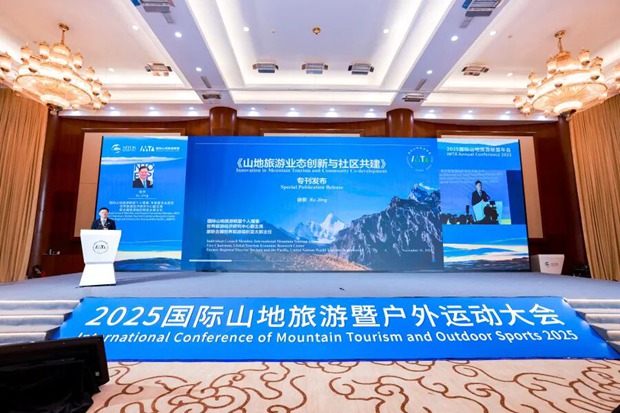
Release ceremony for the publication
"Reviewing the development of contemporary mountain tourism from a global perspective, we observe two forces deeply integrating: the structural transformation driven by format innovation, and the endogenous vitality activated by community co-construction," stated Xu Jing during the release. He elaborated that format innovation extends beyond upgrading products and business models to fundamentally restructuring value concepts—shifting the focus from pursuing visitor numbers and consumption towards emphasizing cultural depth, ecological balance, and social responsibility. Community co-construction, he noted, represents a new ethic in mountain tourism development, transforming local residents from passive participants into active shapers and achieving synergistic economic, social, and environmental benefits. This dual logic of innovation forms the core thematic thread of the publication.
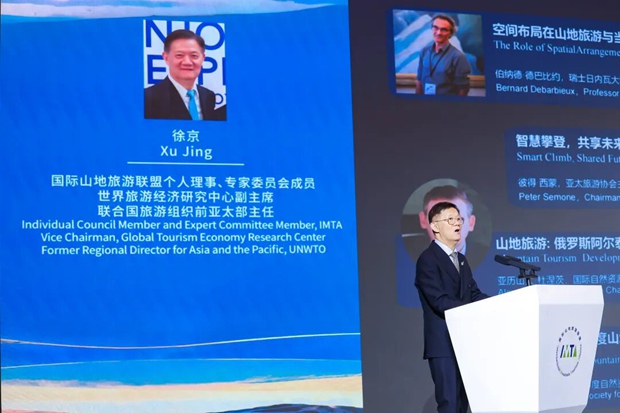
Xu Jing, former Regional Director for Asia and the Pacific, UNWTO, IMTA Individual Director and member of the Expert Committee
Xu Jing introduced that the publication encompasses multidimensional perspectives from international to local practices. Swiss scholar Bernard Debarbieux systematically analyzes diverse models of the relationship between mountain tourism and communities from a spatial structure perspective, proposing the significant viewpoint that "the form of spatial organization determines the quality of social relations," providing a theoretical foundation for understanding tourism-community symbiosis. Professor Dai Bin, President of the China Tourism Academy, in his article, emphasizes that the value of mountain tourism lies not only in resource development but also in ensuring that the benefits of development reach communities and give back to nature. Ms. Haybina Hao, former Vice President of the U.S. Travel Association and former Greater China Director of the World Travel & Tourism Council (WTTC), uses Native American heritage as an entry point to reveal the unique value of cultural tourism in promoting dialogue among diverse civilizations and empowering the cultures of vulnerable groups, stressing a global perspective and humanistic care to "let culture speak for itself." Mr. Peter Semone, Chairman of the Pacific Asia Travel Association (PATA), and his co-author Mark Panayiotis Notaras, explore how smart technology can empower sustainable mountain tourism from a digital innovation perspective, demonstrating the forward-looking value of digital transformation in ecological protection and community well-being.
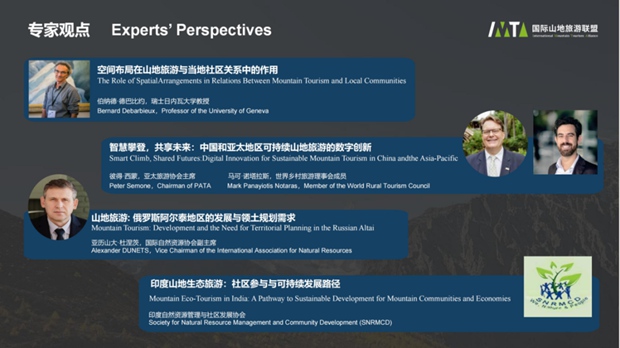
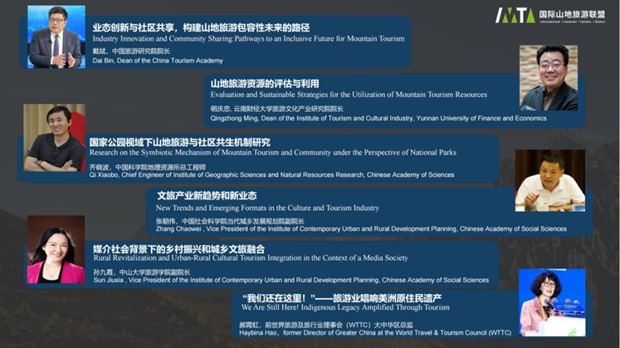
Expert Insights
Furthermore, the publication includes contributions from several renowned Chinese scholars and industry experts, including Chief Professor Ming Qingzhong of Yunnan University of Finance and Economics, Professor Sun Jiuxia of Sun Yat-sen University's School of Tourism Management, Chief Engineer Qi Xiaobo of the Centre for Tourism Research, Planning & Design, Institute of Geographic and Natural Resources Research, CAS, Deputy Dean Zhang Chaowei of the Academy of Contemporary Urban and Rural Development Planning, CAS, and President Wang Jie of the Asia Pacific Hot Springs Research Institute. Their articles expand the understanding of the mountain tourism-community relationship from various angles such as resource assessment, national park governance, all-for-one leisure, cultural and tourism integration and communication, and cultural heritage protection. Together, they build a cross-disciplinary and cross-regional knowledge network, elevating "Innovative Formats and Community Co-construction" from a research theme into a framework for action.
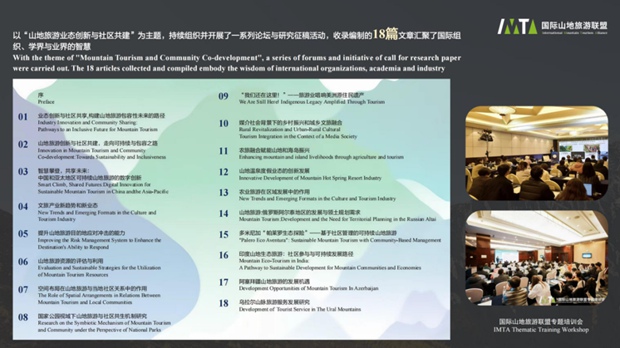
Contents of the publication
Xu Jing expressed that, as a culmination of globally diverse wisdom convened by the IMTA, this publication is hoped to serve as a new starting point. It aims to contribute to promoting the sustainable development of mountain tourism worldwide, continuing to write a new chapter of harmonious coexistence between people and nature, and between communities and the future.
Image and text source: IMTA
Editor Ⅰ: Zhang Wenwen
Editor Ⅱ: Bao Gang
Editor Ⅲ: Liu Guosong














